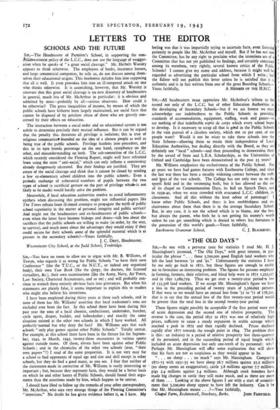THE OLD DAYS "
Sta,—As one with a perverse taste for statistics I read Mr. H. J. Massingham's jeremiad, " The Old Days," with great interest, in par- ticular the phrase " . . . those 3,700,000 good English land workers who left the land between '51 and '91." Unfortunately the statistics I have by me only go back to 1871, but these figures are enough to enable me to formulate an interesting problem. The figures for persons employed in farming, farmers, their relatives, and hired help were in 1871 1,223,027 and in 1891 1,089,719. Thus we get over a twenty-year period % loss of 133,308 land workers. If we accept Mr. Massingham's figure we have a loss in the preceding period of twenty years of 3,566,692 persons. If that were so we would have an annual loss from '51 to '71 of 178,300, that is to say that the annual loss of the first twenty-year period would be greater than the total loss in the second twenty-year period.
These figures might possibly be acceptable if the first period were one of acute depression and the second one of relative prosperity. The reverse is the case, the period 1851 to 1871 was one of relatively high prices, sufficient to cause a steady expansion in arable acreage which reached a peak in 1872 and then rapidly declined. Prices declined rapidly after 1877 towards the trough point in 1894. The problem then is this: an industry in a period of relative prosperity lost three-quarters of its personnel, and in the succeeding period of equal length which included an acute depression lost only one-tenth of its personnel: why? Perhaps Mr. Massingham will offer some explanation that will show that his facts are not as suspicious as they would appear to be.
. no sheep . . . no muck " says Mr. Massingham. Comparing 1871-75 with 1931-35 we have sheep 28.7 millions against 25.2 millions (no sheep seems an exaggeration), cattle 5.8 millions against 7.7 milliOns, pigs 2.4 millions against 3.4 millions. Although stock breeders have made big changes in cattle they• still make muck, and as there are more of them . Looking at the above figures I see with a start of astonish- ment that 3,500,000 sheep appear to have left the industry. Can it be that Mr. Massingham means . . .1—Your faithfully, Chapel Farm, Ecchinswell, Newbury, Berks. JOHN FAIRFIELD.


























 Previous page
Previous page